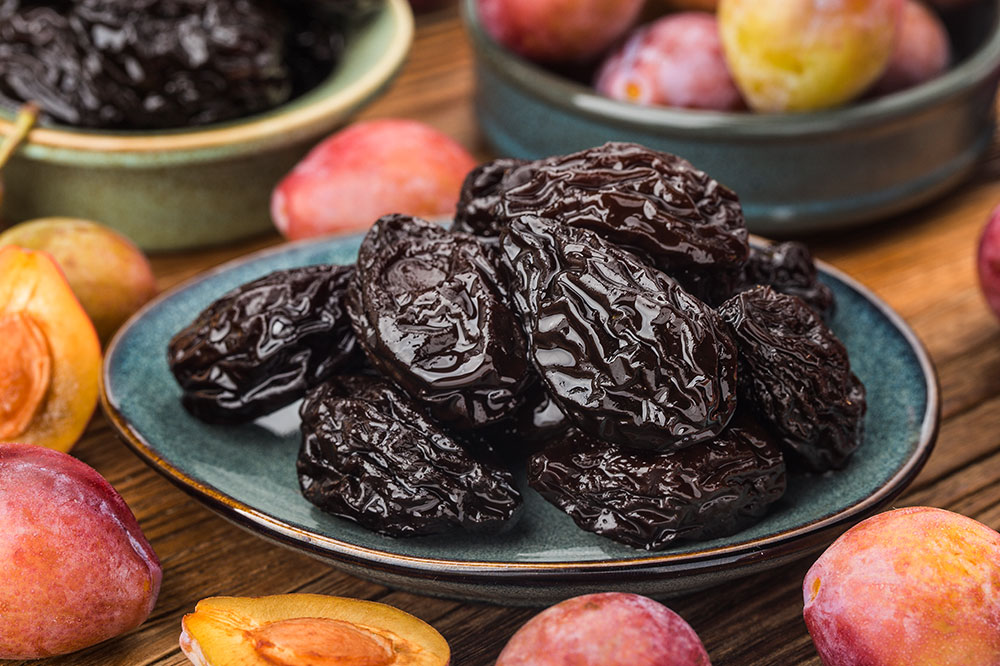
Foods to Eat and Avoid to Manage Constipation
If one passes stools less than three times per week or has bowel movements that are straining, lumpy, or hard, they might have constipation. Research suggests that about 12% of individuals in the country suffer from chronic constipation at some point in their life. The severity of the restrictive complication might differ from one person to the next. And while there are multiple remedies to manage the condition, being mindful of the healthy and trigger foods may help keep bowel movement regular.
5 fiber-rich foods to eat for constipation
Here are five fiber-rich foods that may help improve gut health and prevent or manage constipation.
Prunes
These dry plums (prunes) are used as a natural remedy for constipation. The food is abundant in fiber, and a quarter-cup serving comprises about 12% of the daily value. Prunes contain insoluble fibers (cellulose), which may increase the water in stools and help add bulk. At the same time, the soluble fibers in prunes get fermented in the colon to create short-chain fatty acids, which may also help increase stool weight. The dry plums are also packed with phenolic compounds that stimulate healthy gut bacteria.
Apples
Apples are one of the healthiest foods for several reasons, including promoting healthy bowel movements and reducing constipation. While most of the fiber content derived from the fruit is insoluble, it contains a tiny amount of soluble fibers. An example of the latter is pectin, which is quickly fermented by bacteria to form short-chain fatty acids. This may also increase the water content in the colon, softening the stool and reducing gut transit time.
Pears
Adding fiber-rich food options like pears to meal plans may help alleviate constipation and its associated symptoms. Apart from this, the fruit is known for its high fructose content, a type of sugar that is poorly absorbed by the body and retracts in the colon. The property attracts water through osmosis and stimulates the bowels. Pears are rich in sorbitol, which is also poorly digested, and works as a natural laxative. One could eat pears raw, cooked, or add them to salads and baked goods.
Spinach
One of the healthiest leafy greens for better bowel movements is spinach. The vegetable is abundant in fiber, folate, and vitamins C and K. These elements help add bulk to stools, which subsequently make them easier to pass through the gut. A cup of cooked spinach offers about 19% of the daily value of necessary fibers for the body. One could add spinach to their meal regime by combining it with the recipes for a quiche, pie, or soup. Baby spinach could also be added to raw salads or sandwiches to derive healthy fibers.
Chia seeds
Chia seeds are rich in about 85% insoluble and 15% soluble fibers. Therefore, when they come in contact with water, the food turns into a gel, which helps soften stools and makes it easier to have a bowel movement. Chia seeds are also capable of absorbing 12 times their own weight in water, which makes stools heavier and bulky, subsequently tackling constipation.
Foods to avoid for constipation
On the flip side of healthy foods are others that may trigger or worsen constipation and its symptoms. Here are five unhealthy foods that one should avoid if they suffer from less frequent bowel movements.
Cupcakes
Sugar-rich foods like cupcakes should be excluded from meals if one suffers from constipation. The dessert is high in refined sugars, low in fibers and fluids, and also high in fats. And none of these factors will benefit the body in any way. So, one should steer clear of cupcakes and similar foods like cookies and pastries. As an alternative, they could eat strawberries and yogurt to satiate their taste buds.
Milk
Dairy products like milk may serve as trigger factors for people who suffer from lactose intolerance. The condition can make it tedious for the body to digest lactose (a form of sugar present in milk and other dairy products). The phenomenon may lead to abdominal pain, gas, nausea, vomiting, and constipation. One should remember that the symptoms of lactose intolerance vary from one person to the next. So while some may experience severe symptoms, others may notice mild or no complications from drinking milk.
White bread
Processed grain products like white bread should be sliced out of the meal regime in case of constipation. This is because some portions of the grain, such as the fiber-containing bran, is removed during processing. And the lack of these healthy fibers may result in the lack of bulk required to process stools easily. Other processed grain products one skip from meals include white rice and white pasta.
Eggs
Eggs are known for offering several nutritional benefits. However, an individual with poor bowel movements is better off avoiding or reducing the food from their meal regime. Despite their health benefits, eggs are low in fiber and high in sulfur. This composition may lead to intestinal gas for some individuals, which may lead to bloating and constipation. If one must eat eggs, they should have it with high-fiber foods like fresh spinach or tomatoes to balance the nutritional value received by the body.
Fried foods
An individual may eat fried foods as they seem tasty and are easy to procure at a fast-food joint. But it’s no secret that such foods are void of any nutritional benefits and may lead to one developing an unhealthy lifestyle. Fried foods lack fiber and are drastically rich in unhealthy fats. As a result, foods may move much slower than they should through the colon. Even excessive water might be drained from these foods. Ultimately, eating fried foods will hamper one’s ability to have a regular bowel movement and lead to constipation. It may also trigger other symptoms like gas, stomach pain, and diarrhea in individuals.


